Search the Special Collections and Archives Portal
Search Results
O.C. "Boots" LeBoutillier Paintings
Identifier
Abstract
The collection consists of two watercolor paintings donated and autographed by Las Vegas resident O.C. “Boots” LeBoutillier. The materials were painted and signed by Robert Carlin depicting the crash of Baron Manfred Von Richthofen's (the "Red Baron") airplane on April 21, 1918. LeBoutillier is also depicted in the paintings flying above as the "Red Baron" crashes after being shot down. The paintings were created approximately between 1970 to 1979.
Archival Collection
Downtown Las Vegas Design Drawings
Identifier
Abstract
The Downtown Las Vegas Design Drawings (approximately 2011-2014) is comprised of seven design drawings created for select businesses located in downtown Las Vegas, Nevada. The drawings are colored on tissue and were created by BUNNYFiSH studio, an architectural firm located in downtown Las Vegas, Nevada. The collection includes three drawings for a porte-cochère at the D Las Vegas hotel; drawings for the exteriors of the Hydrant Club, Inspire, and HOP Downtown; and an interior drawing for Scullery.
Archival Collection
Ellen B. Jensen Papers
Identifier
Abstract
The Ellen B. Jensen papers comprise the research notes, drafts with edits, carbons, and articles written by the Las Vegas, Nevada journalist Ellen Jensen who was the editor of and writer for the monthly Las Vegas Review Journal Jr. and writer for the Las Vegas Sun ("Sunday Scene") and Las Vegas Review Journal ("The Nevadan") from 1966 to 1969. Jensen wrote about many topics of interest to Las Vegans, including travel and recreation in southern Nevada, hotel and casino administration and construction, and local nightlife and entertainment.
Archival Collection
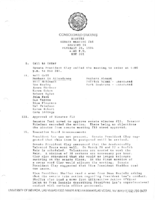
Meeting minutes for Consolidated Student Senate, University of Nevada, Las Vegas, February 28, 1984
Date
Archival Collection
Description
Text

Meeting minutes for Consolidated Student Senate University of Nevada, Las Vegas, May 29, 1996
Date
Archival Collection
Description
Text
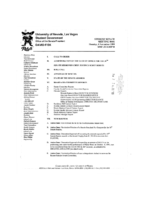
Meeting minutes for Consolidated Student Senate, University of Nevada, Las Vegas, November 08, 1999
Date
Archival Collection
Description
Text
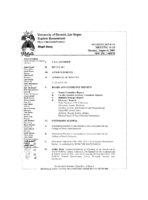
Meeting minutes for Consolidated Student Senate, University of Nevada, Las Vegas, August 06, 2001
Date
Archival Collection
Description
Text
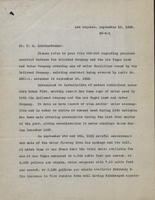
Letter from R. L. Adamson (Los Angeles) to F. H. Knickerbocker, September 10, 1928
Date
Archival Collection
Description
Summary of the amount of water used by the railroad, the water company, and for irrigation on the Las Vegas Ranch in 1928 for use in calculating water rates.
Text
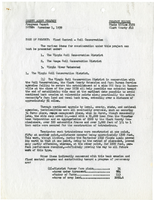
County agent project progress report, Flood control - soil conservation, November 1, 1939
Date
Archival Collection
Description
Report on flood control efforts in the Virgin Soil Conservation District, the Moapa Soil Conservation District, and the Virgin River Watershed. Project Number: State Office #172, Clark Co. #12
Text

